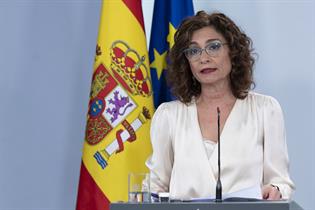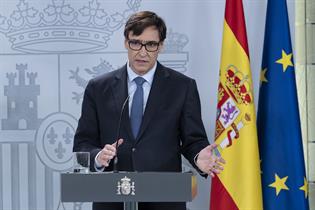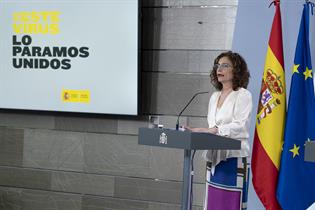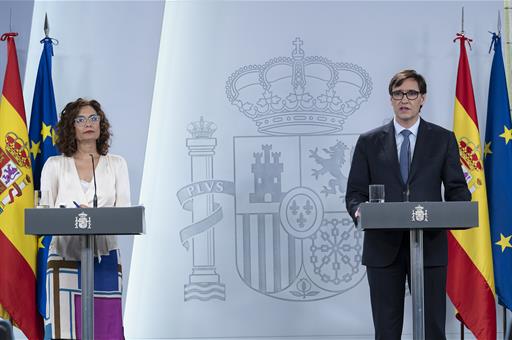Council of Ministers
Government will ask Lower House to extend state of emergency on Wednesday until 11 April
Council of Ministers - 2020.3.24
Moncloa Palace, Madrid
The Council of Ministers agreed, as established in Article 116.2 of the Spanish Constitution, to request the authorisation of the Lower House of Parliament to extend the state of emergency to midnight on 12 April, under the same conditions initially established in the Royal Decree-Law approved on 14 March.
The Minister for the Treasury and Government Spokesperson, María Jesús Montero, stated that this request will be put to a vote on Wednesday and trusted that it will receive the support of the parliamentary groups so as to respond "with strength and unity" in the fight against the coronavirus.
Once this is authorised by the Lower House, the extraordinary Council of Ministers meeting, due to be held on Friday, will approve the effective extension to the state of emergency.
María Jesús Montero acknowledged that an extension to the state of emergency is a "drastic" measure and that the government is aware of the "inconvenience, concern and unease" the situation of confinement causes among the people but warned that it is absolutely necessary to maintain this as a measure to fight the virus effectively. "All the experts agree and all the efforts are pointing in the same direction - that of breaking down the curve" of contagion.
The minister called for the "discipline and effort shown to date" to be maintained and to continue to comply with the recommendations made by the health authorities.
300 million euros for regional governments for social policies
 Pool Moncloa/Borja Puig de la Bellacasa The Council of Ministers approved the distribution of 300 million euros from the Extraordinary Social Fund among the autonomous regions and cities as provided for in Royal Decree-Law 8/2020, approved on Tuesday. The distribution was primarily made according to population, although the dispersion and percentage of people over the age of 65 was also taken into account.
Pool Moncloa/Borja Puig de la Bellacasa The Council of Ministers approved the distribution of 300 million euros from the Extraordinary Social Fund among the autonomous regions and cities as provided for in Royal Decree-Law 8/2020, approved on Tuesday. The distribution was primarily made according to population, although the dispersion and percentage of people over the age of 65 was also taken into account.
The Government Spokesperson explained that these resources must be allocated to the social policies that the regional governments consider to be "essential and pressing" to attend to particularly vulnerable groups, such as the elderly, those in long-term care, the homeless and single-parent families.
Among these necessary actions, María Jesús Montero quoted, by way of example, the increase in services provided directly to people's homes and remote care arrangements, primarily for the elderly, also such services as rehabilitation that are being provided at people's homes, strengthening arrangements for the homeless, the acquisition of preventive resources and the hiring of staff to increase the workforce of social services and residential centres.
25 million euros to feed children
The government confirmed the distribution, agreed with the Inter-territorial Social Services Council, of a 25-million euro fund to guarantee the basic right to food for children in situation of poverty or vulnerability.
This aid will be provided directly or through the provision of food and the beneficiaries will be those families to whom the regional governments or social services have granted free school dinners during the school year in all the compulsory stages from nursery through to secondary education.
María Jesús Montero explained that this aid will continue for as long as education centres are closed, without prejudice to the possibility of revising this term.
20 billion euros in credit to companies, SMEs and independent contractors
The Council of Ministers approved the conditions for the implementation, with a fund of 20 billion euros, of the first tranche of the loan guarantees to companies, SMEs and independent contractors that forms part of the raft of extraordinary measures approved on Tuesday.
María Jesús Montero stressed that the goal of the measure is to help the productive fabric resist the negative effects of the health crisis, allowing it to cater for the needs of financing in order to pay wages, bills and financial and tax obligations, among other expenses.
The loan guarantees will be retroactively applicable for operations granted since 18 March and will guarantee both new loans and the renewal of those already active. Specifically, it will amount to 80% of the new loans and renewals requested by SMEs and independent contractors, while for other companies it will cover 70% of new loans granted and 60% of renewals.
Repatriation flights from Italy authorised
The government has modified the agreement reached on 10 March that banned direct flights from Italy to Spain in order to provide an exception for those flights that exclusively transfer Spanish citizens stuck in Italy.
The Government Spokesperson specified that authorised planes may only land in the airports of Madrid, Barcelona, Las Palmas de Gran Canarias, Malaga and Palma de Mallorca, and those people repatriated must stay at home for the quarantine period, monitored by the health authorities.
Drastic, but absolutely necessary, measures
 Pool Moncloa/Borja Puig de la BellacasaThe Council of Ministers analysed the spread of the coronavirus and the measures adopted by the government to halt its spread and care for those infected.
Pool Moncloa/Borja Puig de la BellacasaThe Council of Ministers analysed the spread of the coronavirus and the measures adopted by the government to halt its spread and care for those infected.
The Minister for Health, Salvador Illa, stated that stress has been detected in the health services of the Region of Madrid in tackling this epidemic, and called for solidarity from the regional authorities, the same as would be provided if a similar situation were detected in other parts of the National Health System.
"The state of emergency grants me, as the competent delegate authority on healthcare, the obligation to oversee the equality and cohesion of the system", argued the minister.
Government action
Salvador Illa explained that the government has developed three actions: to deploy those health resources needed in the Region of Madrid from other parts of the country where they are not so necessary; to activate and step up efforts in the procurement of the most needed materials and products, particularly assisted breathing apparatus; and to boost the existing capacity in Spain to manufacture these products.
In this regard, the Minister for Health appreciated the work of the industrial and engineering groups that are working against the clock to increase the capacity to produce face masks, tests to detect the virus, both standard and rapid tests, and respirators.
The minister recalled that, to date, 5,848,000 face masks have been distributed and work is being done to guarantee a regular supply of these and other products. On this point, Salvador Illa clarified that "the government is not confiscating or banning the purchase of anything", but providing support for all those who request this to procure the material that is necessary. However, he recognised that "the market is highly disorganised" and the government has employed, and will continue with, all possible measures to guarantee the availability of products and ensure that they meet the quality requirements established by the National Health System.
Residential homes for the elderly
During his briefing, the minister stressed that the government has paid special attention, since the outbreak of the disease, to residential homes for the elderly, and on 5 March a compulsory protocol for action was agreed with the regional governments. Furthermore, on 19 March, an Order was issued which established the requirements on the isolation and treatment of infected patient, cleaning at residential homes, the availability of healthcare professionals to provide care in these homes and the monitoring of the sick.
Salvador Illa pointed out that, in light of the spread of the epidemic, the government issued a new Order, published on Tuesday in the Official State Gazette, on a proposal from the Vice-President of the Government and Minister for Social Affairs and 2030 Agenda, Pablo Iglesias. The new legislation is "stricter than before" and establishes measures to intervene in residential homes if they do not follow the instructions already issued and places all of them under the public authority of their corresponding regional government.
The minister also reported that a special group has been set up to address this situation, comprising representatives from the Vice-Presidency of the Government and Minister for Social Affairs and 2030 Agenda, and from the Ministries of Health, and of Defence.
The minister warned that this coming week will be tough and reiterated his thanks to all those groups that are working to defeat the virus and thanked Spanish society that is complying, on a united front, with the drastic measures adopted, which are "absolutely essential".
We must stay at home
 Pool Moncloa/Borja Puig de la BellacasaThe Government Spokesperson highlighted that people must remain united and hopeful in the face of this epidemic because the measures adopted "are those that will allow us to come out victorious". "These are tremendously difficult times which require our collective effort as a country and our capacity for resistance as a society. I believe that the Spanish people are proving this, but our individual discipline is also necessary to strictly comply with the recommendations from experts", she stated.
Pool Moncloa/Borja Puig de la BellacasaThe Government Spokesperson highlighted that people must remain united and hopeful in the face of this epidemic because the measures adopted "are those that will allow us to come out victorious". "These are tremendously difficult times which require our collective effort as a country and our capacity for resistance as a society. I believe that the Spanish people are proving this, but our individual discipline is also necessary to strictly comply with the recommendations from experts", she stated.
María Jesús Montero asked for people to stay at home, thus reducing the transmission of the virus, protecting the elderly and gaining "time that is essential for our healthcare professionals and for our health system".
At the start of her briefing, the Government Spokesperson expressed the government's solidarity with those families of people who are sick or who have died. She also reviewed the work of the professionals in all areas that is contributing to the collective well-being.
Institutional coordination
The Government Spokesperson announced that an extraordinary European Council meeting will be held on Thursday, which the President of the Government will attend by video-conference. A number of sector meetings will also be held with the regional governments.
She also referred to "the huge effort the government is making to facilitate liquidity for the regional governments and the productive business fabric. In this regard, she recalled that the previous Council of Ministers agreed to the largest mobilisation of resources in Spain's democratic history - 200 billion euros to create a social protection network and a foundation for the future recovery.
Non official translation





